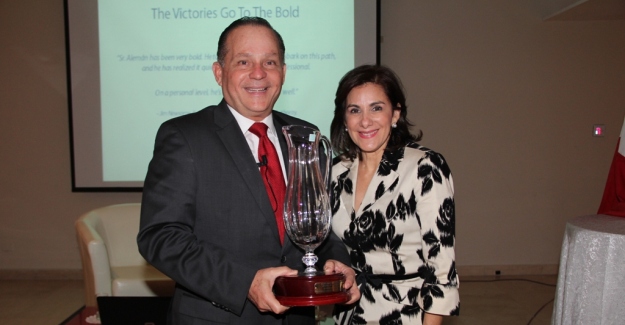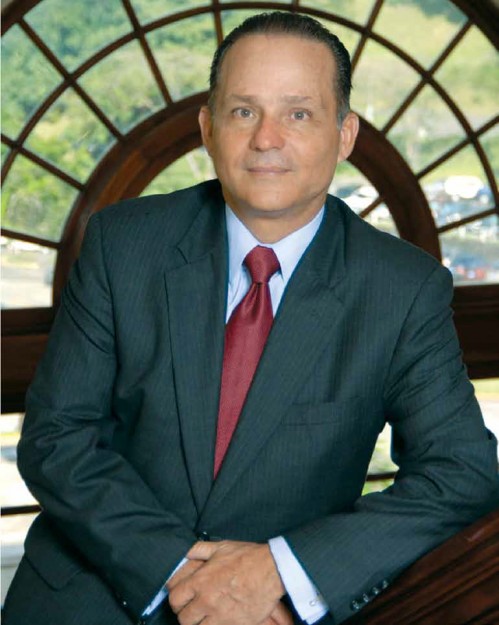
ALBERTO ALEMÁN RESPONSIBLE FOR THE UPGRADING OF THE PANAMA CANAL
Sr. Alberto Alemán Zubieta, former Administrator of the Panama Canal Authority, was inducted into the Institute’s ‘Hall of Fame’ at the Americas Chapter dinner on Wednesday 5th of December 2012. The dinner was held at the El Panama Hotel.This induction is to honor Sr. Alemán’s contribution to the development of the Panama Canal, its expansion project and to the global shipping industry as a whole.
As Administrator of the Panama Canal Authority Alberto Alemán has taken canal traffic from 222 Million tonnes in 1998 to over 322 million tonnes in 2011 – a nearly 70% increase. His pioneering work in this role, including cultivating national pride in the Panama Canal project and serves as an inspiration to current and future generations.
[dopts id=”141″]
Only very rarely is the transport geography of the global logistics industry changed however Alberto Alemán’s overseeing of the expansion of the Panama Canal to make it fit for purpose for modern seaborne maritime trade has done just that, and will help re-establish the Atlantic Ocean as a vital part of that global transport geography.
THE STORY OF ALBERTO ALEMÁN ZUBIETA’S CAREER
Engineer Alberto Alemán Zubieta was Administrator of the Panama Canal between 1996 and 2012. From 1996 to 1999, he acted as Administrator of the former Panama Canal Commission (PCC), federal agency of the United States Government. Since 1999 he served as Administrator of the Panama Canal Authority (ACP). After 16 years serving the country, Mr. Alemán Zubieta, returns to private practice as an engineer and consultant in project management, among others.
Alberto Alemán Zubieta became Panama Canal Commission Administrator in 1996 after succeeding Mr. Gilberto “Cholo” Guardia. His main objective was to prepare a smooth transition of the Canal to Panamanian stewardship on December 31, 1999. The transition period occurred seamlessly and at noon on December 31, 1999, the Canal was Panamanian with no major setbacks.[dopts id=”139″]
Some of the main achievements of Mr. Alemán throughout his tenure at the Panama Canal are the following: In 1995, Alemán Zubieta in his condition as citizen, led – at the request of the Panamanians integrating a Canal Board of Directors with a majority of United States members – a committee of engineers tasked with determining the condition in which the United States was going to transfer the Canal infrastructure. The Committee was binational, and the Panamanian members were: engineers Roberto Roy, Carlos Moreno, Ernesto NG, Moisés Castillo (RIP) and Alvaro Palacios. Representing the United States was the United States Army Corps of Engineers. The committee was called BREC (Blue Ribbon Engineering Committee) and performed on a pro bono basis.
Sr. Alemán Zubieta became Panama Canal Commission Administrator in 1996 after succeeding Mr. Gilberto “Cholo” Guardia. His main objective was to prepare a smooth transition of the Canal to Panamanian stewardship on December 31, 1999. The transition period occurred seamlessly and at noon on December 31, 1999, the Canal was Panamanian with no major setbacks. The Constitution demanded that the Panamanian Canal would be profitable and with that mandate Sr. Alemán changed the way the Canal rendered its services: segmented the market by vessel type; changed the toll pricing system; implemented significant improvements in services, such as the possibility of reserving transits or transit auction slots. Under his leadership and progressive increase in the quality of service, the Canal improved dramatically and it is currently known for its high levels of efficiency and customer satisfaction.
As a result of the study conducted by the BREC, which was headed by Sr. Alemán, the Canal launched an ambitious modernization program of over US$1.2 billion targeted at preventing the Canal from becoming obsolete. Over the years, this would have a tremendous impact on direct contributions the Canal would give the State, and, more importantly, it would generate the resources needed for the Canal to finance, with its own resources, approximately 50% of the Canal expansion program.
Sr. Alemán promoted a completely new management of water resources needed for the Canal and potable water production. He created the Inter-Institutional Committee for the Canal Watershed, a body that brings together Government and organized society to preserve the watershed. So, instead of facing the inhabitants of the watershed, Sr. Alemán devised a successful land titling program that converted the inhabitants in the early advocates and conservationists of the watershed. That program evolved into a Financial Incentive Program, which teaches thousands of farmers to harvest their own lands in a sustainable manner, and the ACP rewards them an economic retribution.
This model has been known as one of the greatest innovations in large basins management. All measures implemented by the Canal under the leadership of Sr. Alemán led to record direct contributions to Panama. It only took six years for the Panamanian administration to widely exceed all the contributions that the country had received from the United States. The State has received more than US$ 8 billion in contributions in the 12 years of Panamanian administration of Sr. Alemán.Sr. Alemán had sufficient decision-making power to reassume the studies for the Canal expansion which were interrupted after the tripartite effort. Sr. Alemán envisioned the project as an opportunity for Panama and assembled a team to analyze the Canal’s capacity and therefore decide exactly on how to proceed. The result was a robust proposal, consisting of more than 150 studies, in which the leading engineering and planning companies in the world participated.As a great spokesperson, Sr. Alemán endeavored in communicating the characteristics of the project throughout the country, achieving almost 80% approval in a national referendum in October 2006. Today, the expansion project is about 50% complete, and its impacts are already echoing in the world, especially the United States, the main user of the Canal, where the White House is working overtime to ensure the ports on the East Coast have the necessary infrastructure to capitalize on the expansion effects.
AN EVENING SHARED BY FRIENDS & INDUSTRY COLLEAGUES
The Institute prepares for each Hall of Fame induction by meticulously researching the career of each laureate and with the help of the candidate set about identifying key people with whom they have shared their career journey. Each person is contacted for a testimonial and is further invited to join with us on the evening of the induction ceremony. The names and biographies of each of the attendees is published in an aide-mémoire a copy of which can be read below.
PANAMA CITY DECEMBER 2102
GIL INDUCTS SR.ALBERTO ALEMÁN INTO ‘HALL OF FAME’
Two-term former administrator of the Panama Canal, Sr. Alberto Alemán Zubieta, was inducted into the Global Institute of Logistics’ ‘Hall of Fame’. for his outstanding contribution to the Global Logistics Industry during his time at the Panama Canal Authority. The induction ceremony took place at the Institute’s Americas Chapter Dinner in the El Panama Hotel, Panama City. Many of Sr. Alemán colleagues attended the event to celebrate with him on his achievement.
As Administrator of the Panama Canal Authority Alberto Alemán has taken canal traffic from 222 Million tonnes in 1998 to over 322 million tonnes in 2011 – a nearly 70% increase. His pioneering work in this role, including cultivating national pride in the Panama Canal project and serves as an inspiration to current and future generations. Only very rarely is the transport geography of the global logistics industry changed however Alberto Alemán’s overseeing of the expansion of the Panama Canal to make it fit for purpose for modern seaborne maritime trade has done just that, and will help re-establish the Atlantic Ocean as a vital part of that global transport geography.
Speaking at the induction ceremony, Roberto Roy, the Minister for Canal Affairs and a long term colleague and friend of Sr. Alemán said:
“Alberto’s nomination [as Panama Canal Administrator] was a blessing for the Canal. There was need for strong leadership and business experience, since we had to change the economic model from a utility to a corporation which had the goal of maximizing the value of the route. Like they say, the rest is history. Today’s important recognition to Alberto is more than deserving, and I, now as Chairman of the Board and Canal Minister, can only be extremely happy for my friend.”
Speaking about his induction to the ‘Hall of Fame’, Sr. Alemán added:
“It is a great honour to be inducted into the Global Institute of Logistics’ Hall of Fame, and I accept this honor not only for me but for the entire team of people that worked in the Panama Canal.”
Speaking at the induction Kieran Ring CEO of the Global Institute of Logistics said:
“Only very rarely is the transport geography of the global logistics industry changed. But this is precisely what Sr. Alemán’s contributions have helped to achieve. His work in changing the operating culture of the Panama Canal, and turning it into a symbol of national pride for the Panamanian people, is truly an inspiration. There are few topics within the logistics press that have garnered more column inches than the Panama Canal – quite a testament to its global impact!”
ABOUT GIL HALL OF FAME
The Global Institute of Logistics Hall of Fame serves as a way to recognize distinguished members of the Global logistics community. Those elected to membership in to the Hall of Fame represent the highest achievement in their field, serving as models of what can be achieved and how. Induction as a Laureate into the Global Institute of Logistics Hall of Fame is a lifetime achievement award for individuals who have made a major, positive impact on the logistics profession as visionary business leaders with a strong commitment to the community. The Global Institute of Logistics Hall of Fame Laureates will serve as inspirations to current and future generations.
Each year the Institute invites the Executive Directors of its various councils and chapters globally to nominate individuals for induction into the Institutes Hall of Fame. These nominations feed discussions about what constitutes excellence and success in individual logisticians. The goal is to improve logistics practice by identifying the outstanding logistician in the field over the course of a lifetime. Nominations are acted on by a panel of expert judges, who decide which nominee will be inducted into the Hall of Fame.

